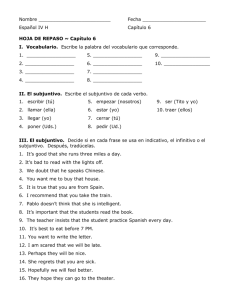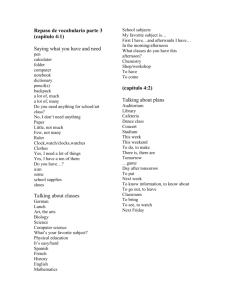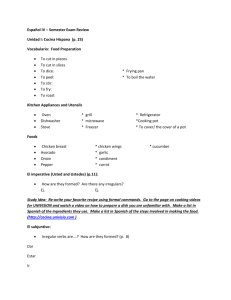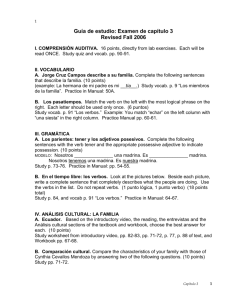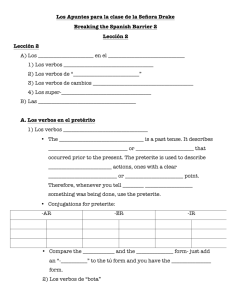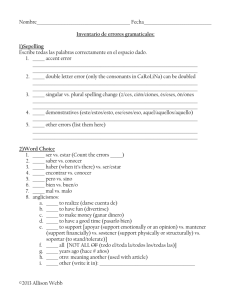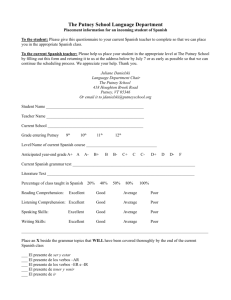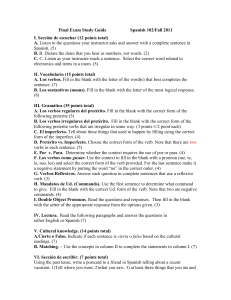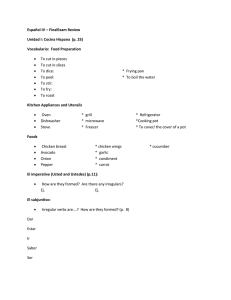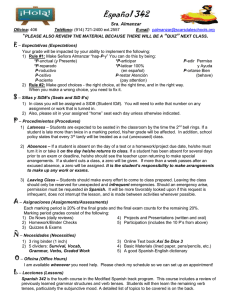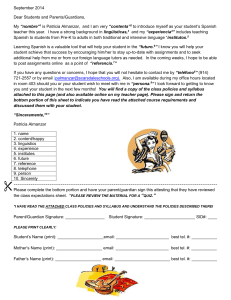Bienvenidos a Español III Syllabus
advertisement
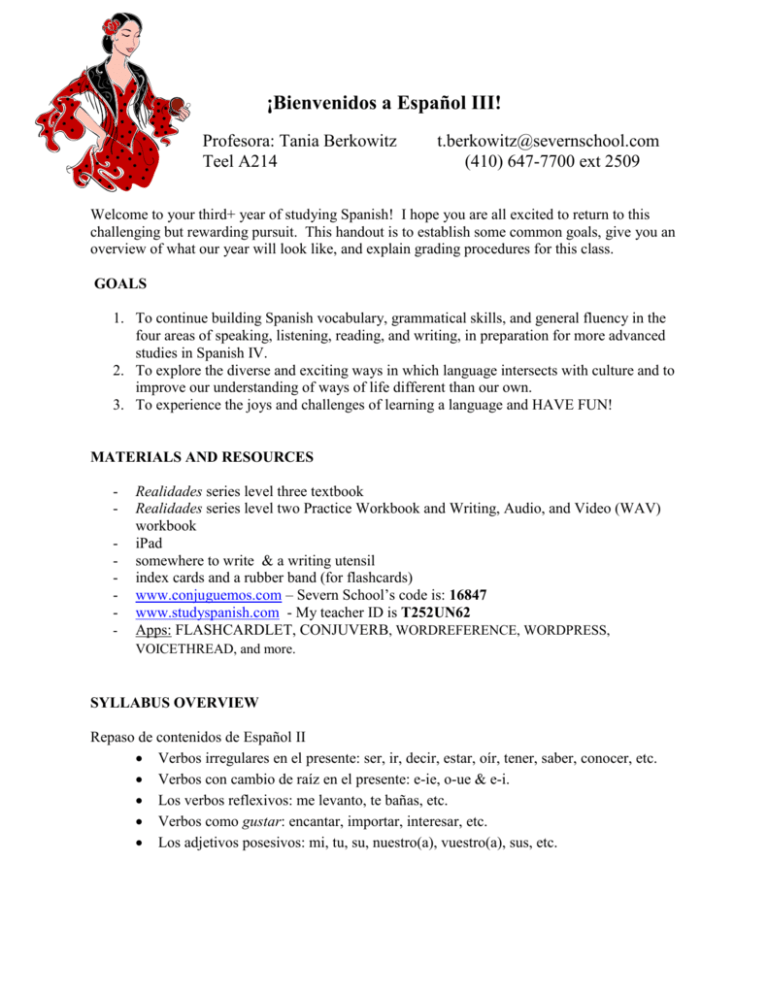
¡Bienvenidos a Español III! Profesora: Tania Berkowitz Teel A214 t.berkowitz@severnschool.com (410) 647-7700 ext 2509 Welcome to your third+ year of studying Spanish! I hope you are all excited to return to this challenging but rewarding pursuit. This handout is to establish some common goals, give you an overview of what our year will look like, and explain grading procedures for this class. GOALS 1. To continue building Spanish vocabulary, grammatical skills, and general fluency in the four areas of speaking, listening, reading, and writing, in preparation for more advanced studies in Spanish IV. 2. To explore the diverse and exciting ways in which language intersects with culture and to improve our understanding of ways of life different than our own. 3. To experience the joys and challenges of learning a language and HAVE FUN! MATERIALS AND RESOURCES - Realidades series level three textbook Realidades series level two Practice Workbook and Writing, Audio, and Video (WAV) workbook iPad somewhere to write & a writing utensil index cards and a rubber band (for flashcards) www.conjuguemos.com – Severn School’s code is: 16847 www.studyspanish.com - My teacher ID is T252UN62 Apps: FLASHCARDLET, CONJUVERB, WORDREFERENCE, WORDPRESS, VOICETHREAD, and more. SYLLABUS OVERVIEW Repaso de contenidos de Español II Verbos irregulares en el presente: ser, ir, decir, estar, oír, tener, saber, conocer, etc. Verbos con cambio de raíz en el presente: e-ie, o-ue & e-i. Los verbos reflexivos: me levanto, te bañas, etc. Verbos como gustar: encantar, importar, interesar, etc. Los adjetivos posesivos: mi, tu, su, nuestro(a), vuestro(a), sus, etc. 1. Capítulo 1: Días Inolvidables Vocabulario: La naturaleza, actividades al aire libre y competencias deportivas. El pretérito: verbos regulares, irregulares y con cambio de raíz. El imperfecto: verbos regulares e irregulares. 2. Capítulo 2: ¿Cómo te expresas? Vocabulario: El arte, la música, la danza y los espectáculos. Pretérito vs. Imperfecto Estar + participio: “El teatro está cerrado hoy.” Ser vs. Estar Verbos con diferentes significados en el pretérito y el imperfecto. Repaso: Comparativos y superlativos, concordancia de los adjetivos. 3. Capítulo 3: ¿Qué haces para estar en forma? Vocabulario: La salud, las enfermedades y la nutrición. Mandatos afirmativos y negativos con tú, usted and ustedes. Formas del subjuntivo de los verbos regulares, irregulares y con cambio de raíz. 4. Capítulo 4: ¿Cómo te llevas con los demás? Vocabulario: La personalidad, el amor y la amistad. El subjuntivo con verbos de emoción POR vs. PARA Mandatos con nosotros: “Pidamos la cuenta.” Pronombres posesivos: “La mochila azul es suya.” 5. Capítulo 5: Trabajo y comunidad. Vocabulario: Palabras relacionadas con conseguir un trabajo y lugares en la comunidad. El presente perfecto: “Hemos hablado de otras oportunidades.” El pluscuamperfecto: “Ellos ya habían estado en su casa.” El presente perfecto del subjuntivo: “Es bueno que hayas trabajado en esto antes.” Los adjetivos y los pronombres demostrativos: este, éste, esa, ésa, etc. 6. Capítulo 6: ¿Qué nos traerá el futuro? Vocabulario: Las profesiones, el campo laboral y características para poder hacer un trabajo. El futuro simple: Esta tarde pasaré por tu casa. El futuro de probabilidad: ¿Qué hora será? El futuro perfecto: Cuando salga del colegio, habré pasado mucho tiempo estudiando español. El uso de los complementos directos e indirectos juntos: “Te los traduciré.” Repaso: Saber vs. Conocer & SE impersonal. 7. Capítulo 7: Mito o realidad Vocabulario: Culturas y tradiciones antiguas, fenómenos inexplicables, el Universo. El presente y el presente perfecto del subjuntivo con expresiones de duda. PERO y SINO El subjuntivo en cláusulas adjetivas: “Busco a un estudiante que haya estudiado este tema.” 8. Capítulo 8: Encuentro entre culturas Vocabulario: Las diferentes culturas, las construcciones y las Américas. El condicional: “Con más dinero, construiríamos un segundo piso en la casa.” El imperfecto del subjuntivo (+ con SI): “Los europeos dudaban que los indígenas aprendieran su lengua.” 9. Probablemente no tendremos tiempo de trabajar con los capítulos 9 y 10 del libro. Estos capítulos hablan de la protección del medio ambiente y de los derechos y deberes de las personas, respectivamente. También cubren otros usos del subjuntivo y del condicional. IMPORTANTE: In addition to the vocabulary and grammar that we will cover this year, we will explore the diversity and richness of Spanish-speaking cultures. With this purpose in mind we will watch Spanish-speaking films and documentaries, read authentic texts, listen and analyze music and art from the Spanish-speaking world, etc. GRADING Grades are calculated on a “total points” system that takes into account the following aspects: - Homework (completed as many times as desired) - Quizzes (vocabulary, verb conjugations, specific grammar points) - Chapter or multiple topics tests - Spoken projects (graded according to a rubric) - Written projects (graded according to a rubric or as total points) - Daily participation (come prepared, active listening, as well as an enthusiasm for speaking). Of course, the reason that many of us choose to take a language in the first place derives from our desire to have conversations with other people. Class time is the only opportunity most of you have on a daily basis to practice your spoken Spanish. For this reason, class participation is considered such a critical part of the grade. *Note: If you miss class, it is your responsibility to check NetClassroom, email me, or phone a classmate to determine what work you missed. If you will miss class because of an anticipated absence (early dismissal for athletics, doctor’s appointment, etc.), you need to come see me before the end of the school day to make a plan for missed classwork. HONOR CODE The expectation is that Severn’s Honor Code – mainly, the pledge not to “lie, cheat, or steal,” as described on the Student Handbook – applies in all aspects of life in this classroom. Many of our projects include group work, but instances when your work is to be entirely your own are made clear. I would always rather have a truthful, upfront conversation with you from the beginning if you feel unprepared for an assessment. On many projects, use of dictionaries is encouraged, but using “Google Translator” or a similar website for an entire phrase or sentence is a common example of plagiarism seen in foreign language classes. Never hesitate to ask if you have questions about an assignment. PROMESA DE HABLAR SOLO EN ESPAÑOL Since I am taking this class in order to communicate, read, write and understand the cultures of the Spanish-speaking world, I recognize that the language of instruction in this course is Spanish and I cannot improve my Spanish without the active use of it. Therefore, I promise to learn my basic expressions and abide by the rules of the class and speak Spanish. I understand that the usage of English during the lesson greatly hinders my ability to maximize the usage of the Spanish language. In addition, I know that usage of English during the class can affect my course grade. Student name: __________________________ Course: _________________________ Signature: ____________________________ Date: ___________________________ Witness: _______________________
